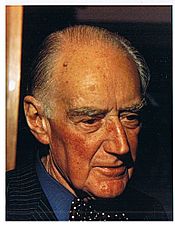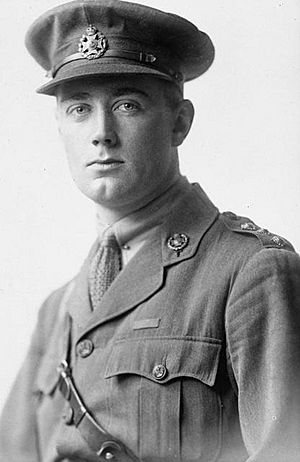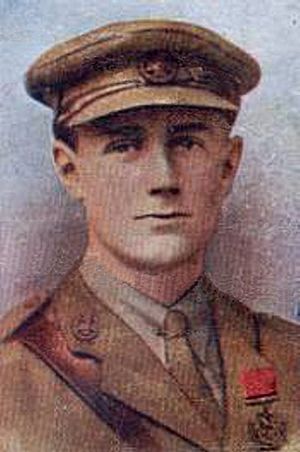Geoffrey Vickers facts for kids
Quick facts for kids
Sir (Charles) Geoffrey Vickers
|
|
|---|---|

Geoffrey Vickers in 1973
|
|
| Born | 13 October 1894 Nottingham, England |
| Died | 16 March 1982 (aged 87) Goring-on-Thames, Oxfordshire |
| Allegiance | |
| Service/ |
|
| Years of service | 1914–1919, 1939–1945 |
| Rank | Colonel |
| Unit | The Sherwood Foresters |
| Battles/wars | |
| Awards |
|
| Other work | Systems scientist |
Sir (Charles) Geoffrey Vickers (born October 13, 1894 – died March 16, 1982) was an English lawyer, writer, and a pioneer in understanding how different parts of a system work together. He was interested in many things. He worked with the London transport system, the Law Society, and groups focused on medical and mental health research. Later in his life, he wrote and gave talks about how social groups and organizations work. An award, the Sir Geoffrey Vickers Memorial Award, is given in his honor each year since 1987.
He received the Victoria Cross for his bravery in World War I. This is the highest military award for courage in the United Kingdom. After World War II, he was knighted, which means he received the title "Sir." During the war, he helped with economic intelligence and was part of a special committee that gathered information.
Contents
Biography
Early Life and School
Geoffrey Vickers was born in Nottingham, England. His father, Charles Henry Vickers, owned a successful lace business. Geoffrey described his childhood home as a very happy place.
He went to Bramcote, a school near Scarborough, and then to Oundle School. In 1913, he started studying Classics at Merton College, Oxford. However, his studies were soon interrupted by the start of World War I.
Serving in World War I
When World War I began, Geoffrey and his brother, William Burnell Vickers, joined the army. Geoffrey became a soldier in The Sherwood Foresters. He was sent to France before the end of 1914. He quickly rose through the ranks, becoming a captain in 1915 and a major in 1918.
He later explained his reason for joining the war simply: "Germany invaded Belgium, we had a treaty with Belgium, so we all stopped what we were doing and went off to war."
He earned the Victoria Cross for his brave actions on October 14, 1915. During a heavy German attack in France, he held a barrier across a trench. He ordered another barrier to be built behind him, even though it meant he would be cut off. He held back the enemy long enough for his comrades to be safe.
His brother, Burnell, was killed in action in 1917. In June 1918, Geoffrey commanded a group of soldiers in the Second Battle of the Marne. For his leadership, he received the Croix de Guerre from Belgium.
Between the Wars
After World War I, Geoffrey Vickers went back to Oxford. In 1919, he earned a degree in French, European history, and law. By 1923, he became a solicitor, which is a type of lawyer. He joined a well-known law firm in London by 1926. He worked on big financial deals, often involving other countries.
During the 1930s, he was involved in important discussions about Germany's financial situation. In 1938, he started a group called the 'Association for Service and Reconstruction'. This led him to meet other thinkers in a group called 'The Moot'. This group included famous writers and thinkers like T. S. Eliot. They met regularly to discuss important ideas about society.
Serving in World War II
Vickers also served in World War II. He was a colonel and worked for the Ministry of Economic Warfare. His job was to gather information about the economies of other countries. From 1941 to 1945, he was part of the Joint Intelligence Committee, which advised top military leaders.
He also served on the board of the London transport system and the Council of the Law Society during this time.
Life After the Wars
After World War II, Vickers had a successful career in management. He then became a well-known writer and speaker. He focused on how different parts of society work together, a field called social systems analysis. He wrote several books, including The Art of Judgement and Freedom in a Rocking Boat. He also came up with the idea of 'Appreciative Systems' to explain how humans understand and act in the world. His ideas were studied by researchers at the Open University.
From 1946 to 1948, he was the first legal advisor for the National Coal Board. This was a huge organization that managed all the coal mines in Britain. He later became a member of the board, in charge of workers, training, education, health, and welfare.
He was also a member of the Medical Research Council and chaired a committee for mental health research. In 1977, he became president of the International Society for the Systems Sciences.
Geoffrey Vickers passed away in 1982. His work continues to influence people today. His military medals are displayed at Nottingham Castle. His writings about systems thinking are kept at the Open University.
Understanding Systems
What are Appreciative Systems?
In his later years, Geoffrey Vickers wrote and lectured about how social groups and organizations work. He was seen as someone who put systems ideas into practice, rather than just an academic. He introduced the idea of "appreciative systems" to describe how humans understand and interact with the world. He believed that to truly understand a system, you need to consider not just what you observe, but also how the people within the system see things.
Vickers explained that we don't have a common word for how we give meaning to information. He called this mental activity "appreciation." The way we do this, which changes as we learn, he called our "appreciative system." He said it's a system because it tries to make sense of things, even if they seem unclear or don't quite fit together.
He also said that he was interested in systems of all sizes, from individual people to large social groups. He was also interested in the ideas and values we use to understand these systems, which he called appreciative systems.
Another thinker, Peter Checkland, explained Vickers' ideas further. He said that our experiences help us notice certain things and judge them against our own standards. These "readinesses" form our appreciative system, which shapes how we see the world. This system changes as we have new experiences.
Vickers suggested that instead of just setting goals, we should think about how we keep desired relationships and avoid undesired ones. This is a continuous cycle:
- Our past experiences create "standards" or "norms" (often unspoken rules) and "values" (ideas of what's good or bad).
- These standards help us notice only certain things in our situations, deciding what "facts" are important.
- We then compare these facts to our norms. This leads us to take action and also changes our norms, so we might judge future experiences differently.
Geoffrey Vickers and Peter Checkland discussed these ideas a lot. Checkland later created a model of the appreciative process based on their talks. This model helps us understand how we make sense of the world around us.
Ideas on Society and Morals
Geoffrey Vickers' ideas about society and morals can be understood through three main points:
- Our ability as humans to respond well to different situations.
- How modern society can be understood by looking at its different organizations and groups.
- The importance of being responsible for keeping human culture and cooperation strong.
Images for kids




